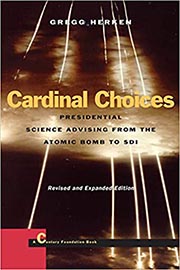Cardinal Choices: Presidential Science Advising from the Atomic Bomb to SDI
by Gregg Herken
Reviewed March 14, 2006
 Gregg Herken's Cardinal Choices: Presidential Science Advising from the Atomic Bomb to SDI, describes the complex relationships between the scientific advisors and U.S. presidents. The book begins with the birth of the Manhattan Project upon the advice of the world's most famous scientist, Albert Einstein. From a single letter, Herken traces this interplay and examines how each president's science advisor influenced, or attempted to influence, national policy, continuing through President Clinton.
Gregg Herken's Cardinal Choices: Presidential Science Advising from the Atomic Bomb to SDI, describes the complex relationships between the scientific advisors and U.S. presidents. The book begins with the birth of the Manhattan Project upon the advice of the world's most famous scientist, Albert Einstein. From a single letter, Herken traces this interplay and examines how each president's science advisor influenced, or attempted to influence, national policy, continuing through President Clinton.
Herken shows the impact of significant scientific milestones; the hydrogen bomb, the space race, the rise and fall of nuclear power, and missile defense, on both the advisors and their administrations. The book explores the tensions that often exist between the advisors and the administration they served. In fact, by 1980, the split was so wide, none in the scientific community wanted the thankless post.
In a time where the current administration appears to ignore the advice of the scientific community on such issues as global warming, alternate energy and stem cell research, this book will provide an important series of lessons from past presidencies.
Gregg Herken was the former senior Historian and the Curator of Military Space at the Smithsonian Institution's National Air and Space Museum and is currently Professor of History at the University of California, Merced.
Available at amazon.com.